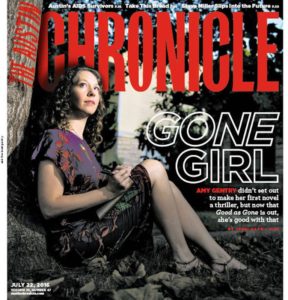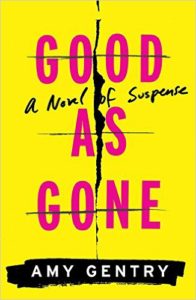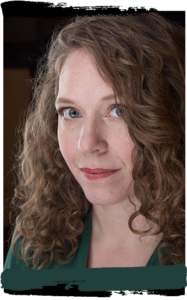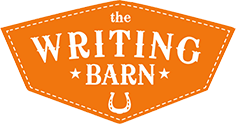This month, The Writing Barn is thrilled to feature Austinite Amy Gentry, author of Good as Gone. She is also a journalist whose work has appeared in the Austin Chronicle, The Texas Observer, and the Chicago Tribune among many other publications.
Don’t forget to join us at The Writing Barn this September 21st for our monthly Words & Wine Wednesday, where Amy will be participating in a discussion panel about Good as Gone, as well as signing copies of her book which will be sold at The Barn.
RSVP HERE
Austin Author Spotlight Interview with Amy Gentry
 Tell us a bit about your latest book. Where did you get the idea for it?
Tell us a bit about your latest book. Where did you get the idea for it?
The idea was an old one I had long ago, when the Elizabeth Smart kidnapping was in the news. I had the idea for a twisty psychological suspense novel about a woman who returns home years after a tragic kidnapping similar to the Smart case, claiming to be the long-missing girl. The family, which has adjusted (however badly) to tragedy, is thrown into confusion by Julie’s unexpected arrival; the mother Anna, to her own horror, eventually begins to doubt the identity of the returned girl. It was a plot that echoed some of the themes of Henry James novels I was reading at the time, as well as exploring ideas about mother-daughter relationships, the way we deal with victims of sexual trauma in our society, and the more general culture of violence toward women, especially vulnerable and marginalized women.
When do you know your book is finally finished and ready to go into the world?
I didn’t! After three years of working on my novel, I’d been working very hard all summer to polish my draft and get ready to query when one day I stumbled upon #PitMad, the biannual Twitter pitching contest. With only 140 characters to describe my premise, the stakes seemed low enough that I ventured a few tweets. Luckily my agent Sharon Pelletier of Dystel & Goderich was scouring Twitter for debut fiction that day, and we happened to be a perfect match. She gave me a chance to push one more strong revision before she gave me her feedback, and after that we did a few more minor rounds of revisions together. Having deadlines and accountability after so long working on my own was wonderful. As a journalist, I have always worked best under pressure. Who knows how long I would have tinkered with it on my own, procrastinating the dreaded querying process, if #PitMad hadn’t appeared? Sometimes a good solid shove out of the nest and straight into the deep end is the most helpful thing. Now I know that if I push hard enough, I can get more done in a week or two than I think I can.
Which books or authors have inspired you the most?
It’s hard to know where to begin, but for this book, the two biggest influences were Henry James and Patricia Highsmith. My love of Henry James is what drove me to get a PhD in English, and I always wanted to write something like a Henry James novel, a psychological exploration of tangled and manipulative relationships among people whose motives were neither purely good nor purely bad, but a strong mixture of both. When I got into grad school, I discovered the novels of the midcentury crime writer Patricia Highsmith, who riffed on Henry James’s novel The Ambassadors in The Talented Mr. Ripley. Using simple, modern language, Highsmith managed to translate Jamesian twistedness into a modern idiom, in a page-turning thriller written from the villain’s point of view. That is more or less precisely what I want my thrillers to do–while keeping the question of just who the villain is in the air as long as possible.
What are you currently reading?
I’m currently reading Emma Donoghue’s latest novel, The Wonder, for review. She’s a longtime favorite of mine; I’ve always loved her feminist historical fiction (which includes Slammerkin and Astray), but when Room came out in 2011, I was gobsmacked that she could also write a stripped-down, utterly gripping and gut-wrenching thriller. Like me, she has a PhD but chose to write novels, and I can only hope that some day I’ll have as many strong titles as she does. At the same time, I’m also deep into researching my 33 1/3 book on Tori Amos’s Boys for Pele, which means I’m reading lots of aesthetic theory, criticism, interviews, reviews, and biographies. It’s a fun combination.
Do you have any advice for budding authors?
I have two solid pieces of advice. The first is to make a little time for a writing ritual every day. For me, it’s journaling–specifically, the three pages of stream-of-consciousness, whatever-I-want-to-say writing Julia Cameron calls “morning pages” in The Artist’s Way. I don’t get to my morning pages every day, but I come pretty close, and making a ritual of it means that I will always have a home-base in writing, even when I’m tired or traveling or too busy. To encourage the habit, I have a specific kind of cheap notebook and a special kind of pen I like. I buy them in bulk and carry one around with me everywhere I go. Every writer goes through times when they’re either too blocked or busy to write, and when that happens to me, morning pages keep me feeling like I’m still using language, still flexing those muscles. Plus it’s great for mental health, and helps improve focus the rest of the day if you do it first thing in the morning.
The second piece of advice: find other writers. Get a writing group and meet once a week. This can be hard to arrange, but it was absolutely crucial for my writing process. Without an audience or any kind of accountability, it’s only human to peter out or get discouraged, especially on a long project. Having your writing group gives you built-in cheerleaders, and the opportunity to reciprocate by cheerleading them, too, which is invaluable. Even one writing partner is enough to provide this type of support, if you meet regularly. Plus, getting to know lots of writers casually makes the whole project of writing seem so much more normal. We all have these voices in our head from our parents, teachers, or even friends, saying, “Writing isn’t a practical career, it’s a waste of time”; the best way to counter those voices in your head is with real-life examples of people who choose to pursue a writing life, in whatever way works best for them. Seeing other people’s successes will help you realize that success is attainable; seeing their failures will make you feel less alone when you suffer through your own inevitable rejections.
What do you think of the literary community here in Austin?
I love Austin’s literary community. We’ve got four MFA programs, of course, which helps feed the scene, but the thing I like best about it is how open and inclusive and collaborative it is. In Austin, all the arts and culture scenes are so interconnected, and the barriers to entry are low–you can almost always find someone to work with you on a magazine, a performance night, a chapbook. Perhaps it’s only because we’re so far away from the money-and-prestige parts of the publishing world, but the friendliness and cross-pollination you find here makes it more than worth the trade-off. Austin may be much bigger than it used to be, but it will always feel like a small town to me, where you can bump into anyone at a coffee shop and find yourself involved in a reading or a workshop almost by accident. The hardest part for me is saying no to great opportunities so I can make actual writing time happen.
 How long have you lived in the Austin area?
How long have you lived in the Austin area?
I first came to Austin for college in 1996; since then, I’ve moved away twice and come back each time. Austin is my home base, where I feel safe and happy. Life might take me other places yet, but it’s hard to imagine I’ll ever live somewhere else permanently. Nowhere else has Barton Springs.
Amy Gentry lives in Austin, Texas, with her husband and two cats. After graduating in 2011 with a PhD in English from the University of Chicago, she began a freelance writing career, writing book reviews, cultural criticism, and, for one strange and wonderful year, a fashion column. She frequently reviews fiction for the Chicago Tribune Printer’s Row Journal, and her writing has appeared in Salon.com, xoJane, The Rumpus, the Austin Chronicle, the Texas Observer, LA Review of Books,Gastronomica, and the Best Food Writing of 2014. GOOD AS GONE, her first thriller, is set in her hometown of Houston, Texas.
For more information about Amy Gentry and her work, visit her site.
